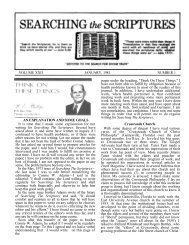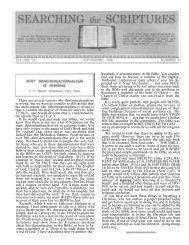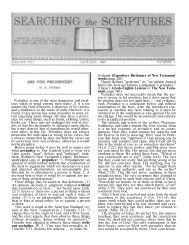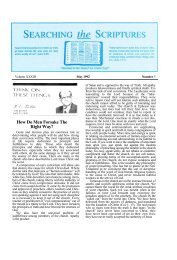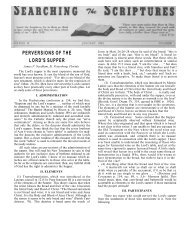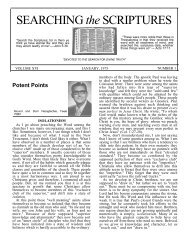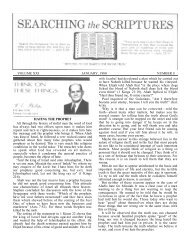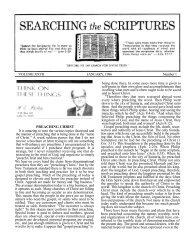Volume 18 – 1977 (PDF) - Searching The Scriptures
Volume 18 – 1977 (PDF) - Searching The Scriptures
Volume 18 – 1977 (PDF) - Searching The Scriptures
You also want an ePaper? Increase the reach of your titles
YUMPU automatically turns print PDFs into web optimized ePapers that Google loves.
PUTTING REPENTANCE INTO PRACTICE<br />
<strong>The</strong> majority of the religious world recognizes that<br />
repentance is one of the conditions of pardon. In this<br />
article, we are not so much concerned with trying to<br />
prove that it is a condition of pardon as we are in<br />
trying to define what is involved in the practice of it.<br />
<strong>The</strong>re are two Greek words that are translated<br />
"repent" in the King James Version. <strong>The</strong> first one is<br />
metametomai, and according to J. W. McGarvey<br />
"literally signifies to have a feeling or care, concern<br />
or regret. It expresses the emotional aspect of<br />
repentance" (Page 176, Vol. 1, Lard's Quarterly).<br />
Such feeling of concern or regret may result in<br />
genuine repentance — or it may degenerate into mere<br />
remorse. As an example of this from the Bible, read<br />
what happened to Judas in Matt. 27:3. We will have<br />
more to say about this later in our discussion.<br />
<strong>The</strong> second word that is given in the Greek that is<br />
translated "repent" is the word metanoeo. I want to<br />
give a number of scholars' definitions of this word.<br />
"To change one's mind for the better, heartily to<br />
amend with abhorrence of one's past sins" (Thayer's<br />
Greek-English Lexicon, Page 405). "A change of will<br />
produced by sorrow for sin and leading to<br />
reformation" (J. W. McGarvey, Page 176, Vol. 1,<br />
Lard's Quarterly). "Repentance denotes our mental<br />
determination to forsake sin, and turning from it (Page<br />
60, Barnes' Notes on Romans). Many others could<br />
be cited, but I believe this is sufficient to show that<br />
repentance is that voluntary change in the mind of<br />
the sinner in which he turns from sins. This involves:<br />
An Intellectual Element — Change of View<br />
A recognition of sin (Cause) as involving personal<br />
guilt, defilement and helplessness is what we mean<br />
by the intellectual element of repentance. As David<br />
said in Ps. 51:3, "For I know my transgression; and<br />
my sin is ever before me." Although there may be a<br />
recognition of sin, and even a confession of it, this<br />
does not necessarily guarantee true repentance. We<br />
see this exemplified in the case of Pharaoh (Ex. 9:27);<br />
and Achan in Josh. 7:20. But true repentance does<br />
not ask "what will my sin bring to me?" but, "What<br />
does my sin mean to God." So it involves in addition<br />
to the mere recognition of sin:<br />
An Emotional Element—<br />
Change of Feeling<br />
A sorrow for sin as committed against goodness<br />
and justice and hateful to God is experienced by the<br />
one who is convicted by the word of God. This<br />
Page 13<br />
element of repentance is indicated by the word<br />
metamelomai (our first definition of the word that is<br />
translated "repent") and is exemplified as in the case<br />
of Judas (Matt. 27:3) and the rich ruler (Luke <strong>18</strong>:23).<br />
Paul expresses it in 2 Cor. 7:9-10 when he says,<br />
"Now I rejoice, not that ye were made sorry, but<br />
that ye sorrowed to repentance: for ye were made<br />
sorry after a godly manner, that ye might receive<br />
damage by us in nothing. For godly sorrow worketh<br />
repentance to salvation not to be repented of: but the<br />
sorrow of the world worketh death." In these<br />
passages Paul uses both of the terms that are<br />
translated "repent" in the King James Version. Let's<br />
read it again and give the proper meaning to the<br />
words that are used. "For though I made you sorry<br />
with a letter, I do not regret; though I did regret: for<br />
I perceive that the same epistle hath made you sorry,<br />
though it were but for a season. Now I rejoice, not<br />
that ye were made sorry, but that ye sorrowed to<br />
repentance: for ye were made sorry after a godly<br />
manner, that ye might receive damage by us in<br />
nothing. For godly sorrow worketh repentance (a<br />
change of will produced by sorrow for sin and leading<br />
to reformation) to salvation not to be repented of<br />
(with no regret): but the sorrow of the world worketh<br />
death." Hence, we must distinguish sorrow for sin<br />
from shame on account of it, and fear of its<br />
consequences. <strong>The</strong> last two, without the first, are only<br />
selfishness.<br />
True repentance does not think of consequences, or<br />
other men as an excuse for failure to repent; but it<br />
sees sin as transgression against God, personal guilt,<br />
and a defiling of one's innermost being. Much "socalled<br />
repentance" is like the little girl's prayer: "Oh<br />
God, make me good—but not real good, but good<br />
enough so I won't get a spanking." But, however<br />
agonizing the sorrow, it will not constitute true<br />
repentance unless it leads to and is accompanied by:<br />
Change of Purpose (Effect)<br />
This involves an inward turning from sin and a<br />
disposition to seek pardon and cleansing as is stated<br />
by the apostle Paul in Rom. 2:4 and put into practice<br />
by the people on the day of Pentecost (Acts 2:36-38).<br />
<strong>The</strong> idea is an abandonment of sin; an act of the will<br />
rather than a state of the sensibility. In the case of<br />
the prodigal son (Luke 15:<strong>18</strong>), he said "I will arise<br />
and go to my father, and I will say unto him, Father,<br />
I have sinned against heaven, and before thee." This<br />
is the effect of a recognition of how good God has<br />
been to each of us and how it grieves Him when we<br />
violate His Word. Thus an abandonment of the sin<br />
was effected.<br />
Conclusion<br />
Godly sorrow is not repentance; and repentance is<br />
not conversion. However, godly sorrow will lead us to<br />
repentance, true repentance; and true repentance will<br />
lead us to conversion, a reformation of life, even as<br />
we are instructed by the apostle Peter in Acts 3:19.<br />
As according to our definition, "Repentance denotes<br />
our mental determination to forsake sin, and turning<br />
from it." If we will not do this, we have not<br />
repented. We will never be able to convince God that



